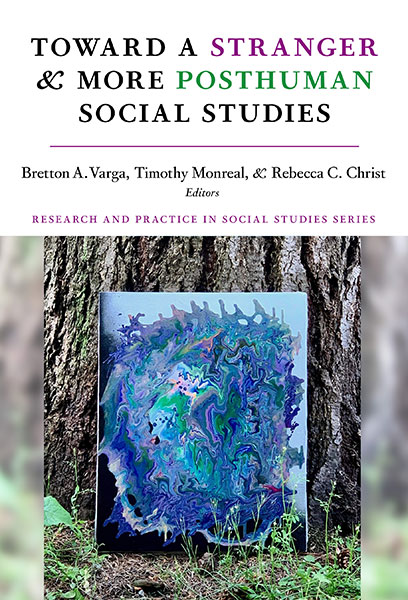Professors: Request an Exam Copy
Print copies available for US orders only. For orders outside the US, see our international distributors.
Edited by: Bretton A. Varga, Timothy Monreal, Rebecca C. Christ
Foreword by: Boni Wozolek
Afterword by: Nathan Snaza
Publication Date: May 26, 2023
Pages: 256
Series: Research and Practice in Social Studies Series

2023 AERA Division B Curriculum Studies Outstanding Book Award Honorable Mention
Posthumanism has seen a surge across the humanities and offers a unique perspective, seeking to illuminate the role that more-than-human actors (e.g., affect, artifacts, objects, flora, fauna, other materials) play in the human experience . This book challenges the field of social studies education to think differently about the precarious status of the world (i.e., climate crisis, ongoing fights for racial equity, and Indigenous sovereignty). By cultivating a greater sense of attunement to the more-than-human, educators and scholars can foster more ethical ways of teaching, learning, researching, being, and becoming. In an effort to push the boundaries of what constitutes social studies, chapter authors engage with a wide range of disciplines and offer unique perspectives from various locations across the globe. This volume asks: How can thinking with posthumanism disrupt normative approaches to social studies education and research in ways that promote imaginativeness, speculation, and nonconformity? How can a posthumanist lens be used to interrogate neoliberal, systemic, and oppressive conditions that reproduce and perpetuate in-humanness?
Book Features:
Bretton A. Varga is an assistant professor of history–social science at California State University, Chico. Timothy Monreal is an assistant professor of learning and instruction at the University at Buffalo, The State University of New York. Rebecca C. Christ is an assistant professor of teaching and learning at Florida International University.
“At the intersections of posthumanisms and social studies unfold important dialogues that attend to ontoepistemological multiplicities—a critical consideration of the many bodies, beings, and imaginations of ‘the social’ that form and inform emergent ways of being, knowing, and doing that are co-constituted therein…. Within these bloomspaces of possibility, this volume addresses how knowledges and beings are de- and re-territorialized through the toppling of monuments, racialization, sacred energies, technologies, the arts, sexualities, and literatures, to name a few. The authors ask readers to consider what it might mean to not only approach social studies from a posthuman lens but what it might mean to teach a posthuman social studies.”
—From the Foreword by Boni Wozolek, assistant professor, Penn State Abington
“Bretton A. Varga, Timothy Monreal, and Rebecca C. Christ provide an indispensable guide to posthumanism in social studies education, essential reading for anyone interested in posthuman framings/orientations in this field. The chapters not only show what ‘posthuman social studies’ means, but also how embracing posthumanism can help social studies educators and researchers enact a more just vision and praxis for humans, nonhumans, and more-than-humans in the world.”
—Michalinos Zembylas, professor, Open University of Cyprus
“Varga, Monreal, and Christ curate a lively collection of chapters and short provocations that beg us to consider the ‘social’ of social studies in our more-than-human world. The authors illustrate that while all bodies co-create realities, truths, knowledges, and relationalities, not all bodies are one and the same in this powered world. The book is full of poignant, timely narratives crafted to demonstrate how the past, present, and future are all entangled. The result: each reader must consider how pedagogies matter in the becoming of our strange world.”
—Candace R. Kuby, professor, University of Missouri
Contents
Foreword: Becoming Posthuman Social Studies Boni Wozolek xi
Acknowledgments xvii
Introduction: Be(com)ing Strange(r): Toward a Posthuman Social Studies Bretton A. Varga, Timothy Monreal, and Rebecca C. Christ 1
1. Life Lessons: Posthuman Ideas About Life for an Enlivened Social Studies Education 11
Mark E. Helmsing
2. A Thousand Deaths: Current Events and Racial Reproductions of the Dead and Dying 23
Asilia Franklin-Phipps
3. Unsettling the “Social” in Social Studies 35
Cathryn van Kessel
4. Toppling the (Hu)Man: Posthumanism and the Mattering of Historical Spaces 38
Francisco A. Medina, Karen Zaino, and Debbie Sonu
5. Lives in/of Things 51
Sandra J. Schmidt
6. Cities as Pedagogues: Materiality in Paris’s Public Sphere as a Teacher of Consciousness 54
Avner Segall
7. Mattering the Research 68
Jelena Aleksic
8. Set in Stone?: Social Studies Teacher Candidates’ Conceptions of Matter 71
Morgan P. Tate and Amelia H. Wheeler
9. Following for the Community 81
Polina Golovátina-Mora
10. “I’m a Monster Now”: The Construction of Spacetimemattering Through Intra-Action in Childhood 83
Fernando Guzmán-Simón and Alejandra Pacheco-Costa
11. Arboreal Methodologies: The Promise of Getting Lost (With Feminist New Materialism and Indigenous Ontologies) for Social Studies 93
Jayne Osgood and Suzanne Axelsson
12. Into the Sea: A Fictive Speculation on How to Cope at the End of the World 110
Peter M. Nelson
13. Not as Strange as Dying: Reimagining U.S. Social Studies as Place-Based and Decolonialized 121
Janice Kroeger and Christine Widrig
14. Possibilities for Knowing Differently With a More-Than-Human Ladybird-Pedagogue 133
Karen E. Barr and Hannah Seat
15. (In)Separatable: Social Studies With/out the Human 136
Sarah B. Shear
16. The (Self/Re)generating Sacred Energy Called Teotl: Using Nahua Philosophy to Introduce Posthumanist Thinking 139
Timothy Monreal and Jesús Tirado
17. Beading Shkodé 149
Browning Neddeau
18. Re/Membering Ethical Relationality: Re/Telling Stories of Dis/citizenship as Lived 151
Muna Saleh
19. Nonhuman Alliances 163
Polina Golovátina-Mora
20. Youth Are Already Queer: Agentive Possibilities Among Queer TikTok Creators 165
Sandra J. Schmidt, Eric Estes, and Isabel Gomez
21. Any/bodies: Posthumanism and Economics Education 179
Erin C. Adams
22. Indeterminacy and Strangeness in the Posthuman Classroom: Thinking Toward Possibility 191
Alexandra L. Page
23. Embracing Strangeness, but Not Becoming Strangers 194
Alexander S. Butler
Afterword: Afterwards, Nathan Snaza 205
Appendix: Guiding Concepts 211
Endnotes 217
Index 227
About the Editors and Contributors 236
2023 AERA Division B Curriculum Studies Outstanding Book Award Honorable Mention
2023 AESA Critics’ Choice Book Award
Professors: Request an Exam Copy
Print copies available for US orders only. For orders outside the US, see our international distributors.